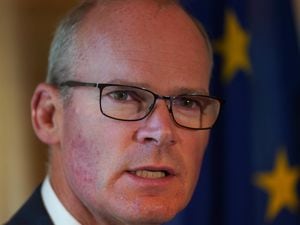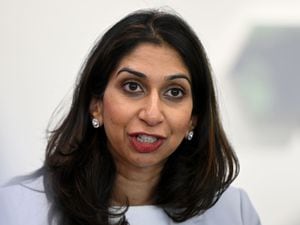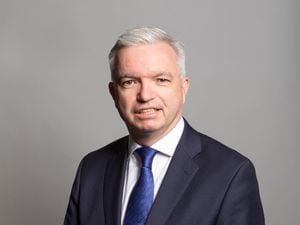Coveney: Varadkar was ‘stating a fact’ that NI Protocol is a little too strict
The Foreign Affairs Minister made the comments after meeting UK Foreign Secretary James Cleverly at the Irish embassy in London on Thursday.

Ireland’s Foreign Affairs Minister has said the country’s deputy premier was “stating a fact” when he conceded that the Northern Ireland Protocol was a “little too strict”.
Simon Coveney said Leo Varadkar was “right” that the protocol is working without being fully operational and the EU is willing to be more flexible.
Mr Varadkar said on Thursday that the protocol was working despite not being fully implemented, demonstrating there was room for “further flexibility for some changes”.
Speaking on Irish broadcaster RTE, Mr Coveney said: “It is clear because of the compromises that have come from the EU in recent months that they are willing to look at more flexibility and support a lot more flexibility in terms of how the protocol is implemented than was the position at the start.
“So, Leo is right on that.”
He added: “Maros Sefcovic, who’s the key negotiator on the EU side, has already published a number of papers to show that the EU is willing to be a lot more flexible. So, Leo was just stating a fact.”
The Foreign Affairs Minister made the comments after meeting UK Foreign Secretary James Cleverly at the Irish embassy in London on Thursday night.
It was the first bilateral meeting between the UK and Ireland since Liz Truss became UK Prime Minister.
A formal meeting will take place later at the British-Irish Intergovernmental Conference on Friday.
It will be co-chaired by Mr Coveney and Northern Ireland Secretary Chris Heaton-Harris.
The protocol was agreed by the UK and EU as part of the Withdrawal Agreement and sought to avoid a hard border with Ireland post-Brexit.
However, the arrangements have created trade barriers on goods being shipped from Great Britain to Northern Ireland.
The protocol is vehemently opposed by many unionists in Northern Ireland and the DUP is currently blocking the formation of a power-sharing executive in Belfast in protest.
Mr Coveney said relationships were changing and there were efforts on both sides to improve trust in Dublin and London.
“There is certainly a new era of positivity and I think that has created a flicker of optimism,” he said.
But he warned that nobody should “get carried away” with the “warm language at the moment”.
“I certainly think we should recognise that there is a genuine effort coming from this new team in the British Government to try to reach out to Dublin, and indeed to Brussels, and sending the signal that they’re up for a serious discussion to try to resolve these issues,” he added.
“But time will tell whether the compromises necessary to get a deal are possible.”
Asked about the Northern Ireland Protocol Bill going through the UK parliament, Mr Coveney said negotiators should “ignore” the bill.
“I don’t think we should focus on it right now,” he said. “This is a bill that’s not going to become law any time soon.”
He added: “We expect it to be stuck in the system for quite some time. That gives us a window of opportunity to negotiate an outcome that doesn’t involve unilateral action or unilateral legislation, which as I’ve said many times would cause an awful lot more problems than it will solve.
“I think the focus to be fair on all sides, the British government, the Irish government, and the European Commission, is to effectively ignore that legislation for now and to focus on honest, real dialogue, which we haven’t had, by the way, since February, to try to make a breakthrough here.”
Mr Coveney added that if a breakthrough is not made by October 28 the Northern Ireland Secretary will be obliged to set a new date for elections in the region, which he warned would “take us backwards”.
Speaking in Prague, Ireland’s premier Micheal Martin said he “would not understate the difficulties” in attempting to find a resolution to the impasse.
He reiterated that space needs to be created for negotiators to work and that he would not provide daily commentary on the matter.
“I do think space needs to be created,” the Taoiseach said.
“I think I would not understate the difficulties that are there. The European Union and the UK Government are beginning the process. I think we should allow space to see what emerges from that.”
Asked about the warm reception UK Prime Minister Liz Truss received at the European summit in Prague on Thursday, Mr Martin said: “The UK Government is determined to make sure that there’s a constructive relationship with the European Union, and with key member states, not least because of the very big geopolitical issues facing us.”





